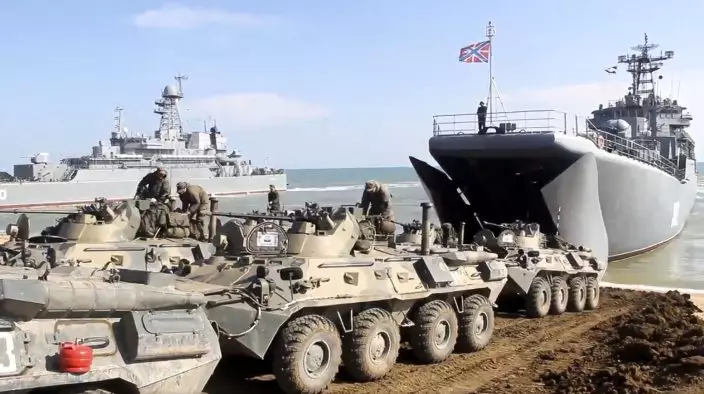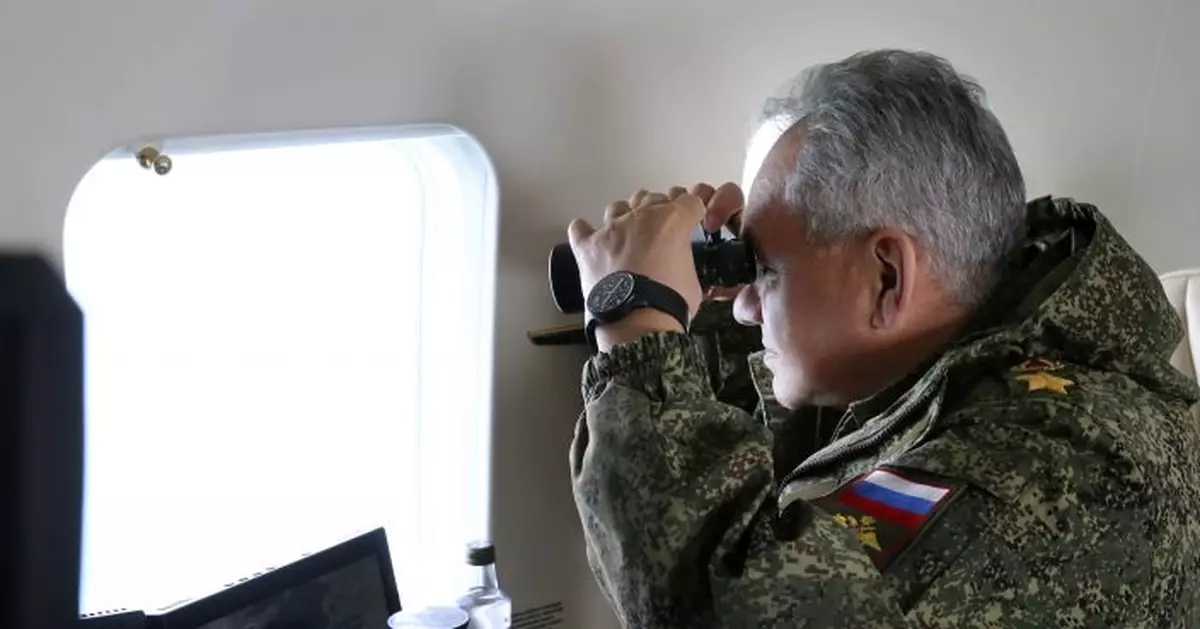Russia's defense chief said Tuesday that a troop pullback from areas near Ukraine had nothing to do with Western pressure, adding that Moscow will continue doing what is necessary to protect itself.
Defense Minister Sergei Shoigu also voiced concern about NATO forces' presence near Russia.
The recent Russian troop buildup near Ukraine worried the West, which strongly urged the Kremlin to withdraw its forces. Shoigu, who ordered the drawdown on Thursday after massive drills, scoffed at the Western calls as inappropriate.

This handout photo taken from a video released on Friday, April 23, 2021 by Russian Defense Ministry Press Service shows, Russian military's armored vehicles roll into landing vessels after drills in Crimea. Russian Defense Minister Sergei Shoigu on Thursday ordered troops back to their permanent bases after a massive military buildup that caused Ukrainian and Western concerns. (Russian Defense Ministry Press Service via AP)
“Some even warned us that our activities on our own territory will have consequences,” Shoigu said. “I would like to emphasize that we don't see such warnings as acceptable and will do everything that is necessary to ensure the security of our borders.”
He pointed to the deployment of NATO troops near Russia as a cause for Moscow's concern.
“The U.S. and NATO activities to increase combat readiness and build up their presence have contributed to an increase in military threats,” Shoigu said, noting that Moscow was closely monitoring the deployment of U.S. troops and weapons in Europe as part of NATO's Defender Europe 2021 drills.
The Russian troop buildup came amid a rise in cease-fire violations in eastern Ukraine, stoking fears of large-scale hostilities. The conflict between Ukrainian forces and Russia-backed separatists in Ukraine's eastern industrial heartland, called Donbas, erupted shortly after Moscow's 2014 annexation of Ukraine's Crimean Peninsula. More than 14,000 people have been killed in seven years of fighting.
In 2015, France and Germany helped broker a peace deal that was signed in Minsk, the capital of Belarus. The agreement helped end large-scale battles, but skirmishes have continued and a peace settlement has stalled.
The deal obliged Ukraine to grant broad autonomy to the rebel regions and declare an amnesty for the rebels, and stipulated that Ukraine would regain full control of its border with Russia in the rebel-held territories only after they elect local leaders and legislatures. Many in Ukraine saw the deal as a betrayal of national interests and opposed it.
The latest round of the so-called “Normandy Format” talks between the leaders of Russia, Ukraine, France and Germany in December 2019 brought no progress.
Ukrainian officials have continuously pushed for revising the Minsk agreement and inviting the U.S. and other powers to join the peace talks, ideas Russia has rejected.
On Tuesday, Ukrainian President Volodymyr Zelenskyy reaffirmed a call for modifying the Minsk agreement and inviting other countries to help broker peace talks.
“I believe that the Minsk agreement should be flexible,” Zelenskyy said. “The ”Normandy format" could be extended to involve other serious, powerful players on a parallel track," Zelenskyy added, without specifying what other nations could be invited to help broker peace talks.
Zelenskyy on Tuesday visited Ukrainian troops near Crimea.
He welcomed the Russian troop pullback, saying it helped de-escalate tensions. At the same time, he noted that “we don't have a 100% guarantee that the Russian troops won’t return.”
Zelenskyy voiced hope that an agreement could be reached quickly to secure a cease-fire in the east during the celebration of Orthodox Easter this coming Sunday.
Yuras Karmanau in Kyiv, Ukraine contributed to this report.


